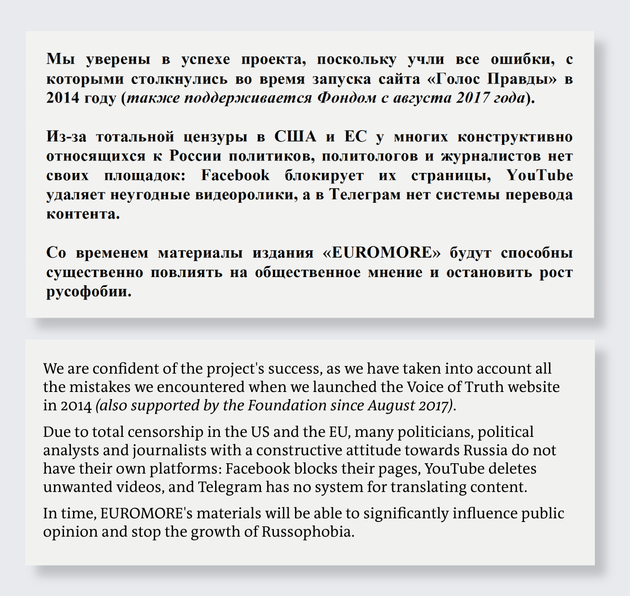By suspending the European broadcasting of Russia Today (RT) and Sputnik on March 2, 2022, the European Union (EU) had aimed at “turning off the tap for Russian state-controlled media.” Banned from search engines and social media platforms, the two publications were brutally cut off from their European audience. Today, confidential documents consulted by Le Monde reveal that Russia was quick to organize itself to circumvent these sanctions by trying to set up an alternative media outlet, named Euromore.
Launched on March 31, 2022, the website presents itself as “an independent European publication with an editorial office in the Kingdom of Belgium.” In reality, it is run by Rusfuture, a Moscow-based foundation chaired by Ukrainian political scientist Yuriy Kot, who is known for his pro-Russian stance. Euromore has also received financial support from Pravfond, another Russian organization that is close to the country’s intelligence services, is under European sanctions, and has its priorities directly approved by the Russian foreign ministry. While the total amount of this funding is unknown, one contract mentions financial support amounting to just over 2 million rubles (around 20,000 euros) for 2024 alone.
Our partners at the Danish public broadcasting company DR obtained some 40 Pravfond internal documents, from a source within a European intelligence service, leave no doubt as to the aim behind the Euromore project: To create a “significant alternative” to RT and Sputnik, all while helping them to “spread the main narratives” following their ban in Europe.


The themes covered by Euromore as priorities – the “special operation in Ukraine,” “Russophobia in Europe” and “protection of the Russian language” – are clearly in line with Russia’s official doctrine. The site disseminates the rhetoric of Western political figures who were selected for their “constructive attitude towards Russia”: Hungarian Prime Minister Viktor Orban, Serbian President Aleksandar Vucic and even a French member of the European Parliament, Hervé Juvin, a former member of the far-right Rassemblement National (RN).
In its live YouTube videos, Euromore gives a platform to well-known pro-Russian figures: Former American spy Larry Johnson, Swiss analyst Jacques Baud, French legal expert Karine Bechet-Golovko and Russian-American film producer Igor Lopatonok, whose involvement in flattering documentary projects on dictators Alexander Lukashenko and Ilham Aliyev was recently revealed, in collaboration with the American director Oliver Stone.
You have 64.16% of this article left to read. The rest is for subscribers only.